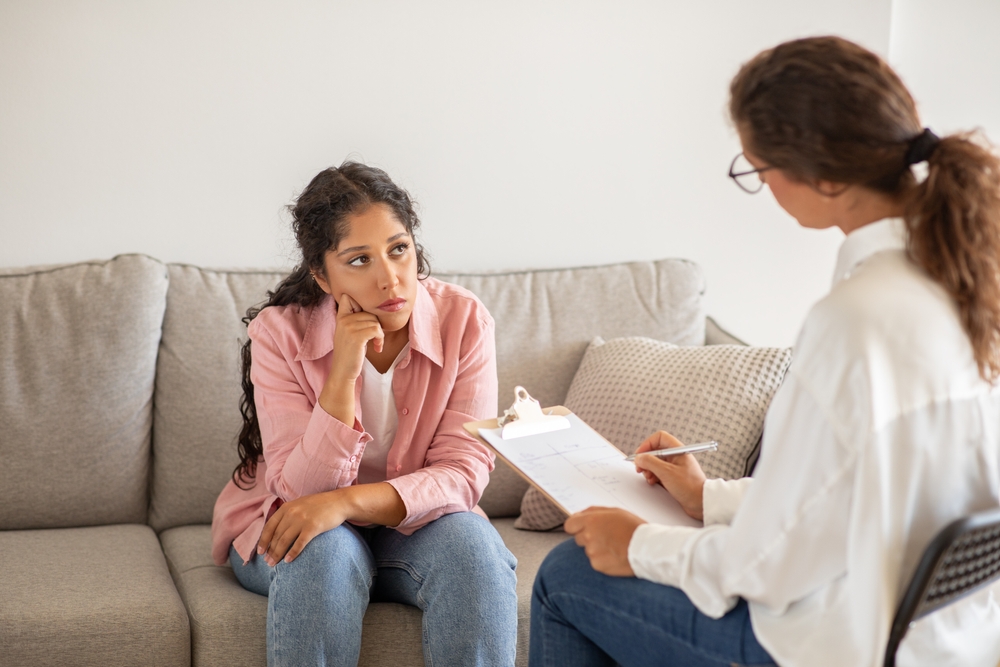Last Updated:
June 20th, 2025

Your first therapy session can feel like a leap into the unknown. Will you be expected to talk about everything straight away? Will the therapist understand what you’re going through? These are natural worries, and you’re not the only one who’s had them. But therapy isn’t about putting you on the spot. It’s about creating a space where real change can begin, at your pace.
What is addiction therapy?
Addiction therapy is a form of psychological treatment designed to help people understand and recover from addiction. It focuses on the emotional, behavioural and mental aspects of substance use or compulsive behaviours, giving you a safe space to explore why addiction developed and how to build healthier ways of coping.
Addiction therapy isn’t one-size-fits-all. There are several types of therapy available, and the one recommended for you will depend on your personal situation.
Common therapies used in addiction treatment include:
- Cognitive behavioural therapy (CBT)
- Dialectical behaviour therapy (DBT)
- Group therapy
- Family therapy
- One-to-one counselling
- Motivational interviewing (MI)
- 12-Step facilitation therapy
Each therapy brings a different approach, and many rehab programmes use a combination to give you the best chance at long-term recovery.
Everything you need to know about your first addiction therapy session
Being told to start addiction therapy can stir up all sorts of nerves. Opening up to a stranger or a whole group isn’t easy. But once you settle in, it often becomes one of the most helpful parts of recovery. Here’s a breakdown of common therapies, why they’re recommended and what your first session might look like.
Cognitive behavioural therapy (CBT)
CBT is a structured therapy that helps you understand how your thoughts, emotions and behaviours are linked, especially when those patterns lead to addictive behaviour. It teaches practical strategies to spot unhelpful thinking and replace it with healthier responses.
Dialectical behaviour therapy (DBT)
DBT helps you manage overwhelming emotions, impulsive behaviours and relationship conflict. It includes skills like mindfulness, emotional regulation and distress tolerance, making it useful when emotional pain drives your addiction.
Group therapy
Group therapy involves meeting with others who are also in recovery. Everyone gets the chance to share and listen. You’re not expected to speak every time, but over time, the group can become a source of connection, reflection and mutual encouragement.
Family therapy
Family therapy brings together you and the people closest to you to rebuild trust, set boundaries and understand how addiction has affected everyone involved. It’s not about blame. It’s about moving forward together.
How is addiction therapy used in addiction recovery programmes?
Therapy sits at the heart of most addiction recovery programmes. While detox helps clear your body of the substance, therapy is what helps you understand why the addiction took hold in the first place and how to stop it from taking over again.
In many cases, therapy can begin as early as the detox stage, especially if you’re finding the experience emotionally or physically difficult. Having someone to talk to during this period can provide comfort, support and early insight into how you tend to cope with discomfort.
Once detox is complete, therapy becomes even more central. This is where you start to dig into the root causes of your addiction, whether that’s past trauma, stress, low self-worth or something else entirely. Understanding the underlying reasons behind your addiction is what gives therapy its power. It helps you become aware of your patterns, your triggers and the beliefs that may have kept you stuck.
From there, you and your therapist (or therapy team) can build a personalised and far more effective relapse prevention plan.
What are the next steps?
If you’re struggling with addiction, it can feel overwhelming, but support is available. At UKAT, our recovery plans are built around evidence-based addiction therapies that go beyond just treating symptoms. We help you understand the root of your addiction and build real, lasting change. Reach out today and take the first step toward a healthier, more stable future.


